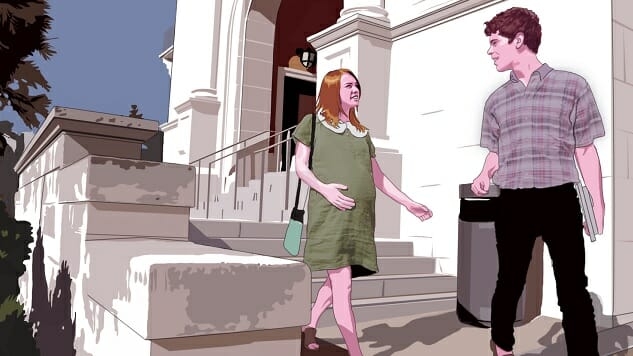The 1966 University of Texas clock tower shooting ought to be a footnote in American history and not a reference point for contemporary national woes. That Tower, documentary filmmaker Keith Maitland’s animated chronicle-cum-reenactment of that massacre, should feel as relevant and of the moment as it does, then, is startling, or perhaps just disheartening. It was 50 years ago this past August that Charles Whitman ascended the university tower with a cache of guns, killed three people inside, and went on to kill another 11 plus an unborn baby over the course of an hour and a half. Back in those days, a public act of violence on this level was an anomaly piercing the veil of our sense of security. Today, it’s just Sunday.
Orlando, Roanoke, Fort Myers and Houston, among far too many others, are the tragedies we contend with today, but in 1966 in Austin, Whitman arguably wrote the urtext for the modern mass-shooting culture Americans have numbed themselves to, one gun-facilitated incident after another. Whitman wasn’t the first person to rain death on unsuspecting people going about their daily routine—Howard Unruh has him beat by just under two decades—but his actions maintain their infamy regardless. Tower wraps the horror Whitman wrought in a rich, rotoscoped blanket, the vibrancy of Maitland’s palette lending urgency and vitality to the horror he and his cast recreate on screen. You could call it sensational. You could call it exploitative. You could also be wrong. Bucking convention isn’t the same thing as profiteering.
Besides, Tower is invested in its primary sources. They’re an essential component of Maitland’s production, “they’re” translating to “survivors of the shooting,” whom the audience first becomes acquainted with through surrogacy. Maitland has assembled an ensemble comprised of mostly unknown actors (for context, Violett Beane and Chris Doubek are probably the highest-profile performers of the bunch) to bring the shooting to life, such as it is, and alongside his troupe he has collected the people who lived through it, including Claire Wilson (Beane), the first victim of Whitman’s rampage (her baby was the second) and John “Artly” Fox (Séamus Bolivar-Ochoa), a UT student who helped pull Wilson to safety as she lay bleeding on the ground beside her dead fiancé, Thomas Eckman.
We don’t see their flesh-and-blood visages until roughly around the time that Tower closes in on the end of the shooting, but see them we do. As the film winds down, Maitland leans more and more on what we consider the industry standards of the documentary form: talking head interviews interspersed with archival footage. These are the things that the rest of the movie is made of, too, of course, but Maitland’s decision to bathe both in artifice sets the film apart from its own standards. (For the record: Tower doesn’t rotoscope all of the archival footage present in its first hour, only a portion, and when it does it often juxtaposes the untouched footage with Maitland’s animated envisioning through editing.)
Maitland’s artistic representation of these events is striking, and you may assume that he intends to be timely in releasing the film in the year of their semi-centennial anniversary. That the film is as meaningful today as it would have been in 1966 is a grim testament to how little things have changed since then, though it must be said that much of what has changed doesn’t paint an especially sunny tableau. The lethal efficacy of commercially available firearms, for example, has advanced enough in the intervening years that it isn’t hard to imagine Whitman’s final body count being much higher in 2016 than it was even in 1966, and what of the fear Austin police officer Houston McCoy (Blair Jackson) expresses regarding the shooter’s identity at the film’s 11-minute mark?
“I just thought, ‘There’s a thousand windows up there, and a thousand Black Panthers, a revolution, and the hair just stood up on the back of my neck,’” McCoy tells the camera. We’re inclined, perhaps, to forgive the comment based on both its distance from today and its point of origin, and yet it’s hard not to shake off the sense that these words reflect current racial discords and divides (which in turn makes them harder to dismiss). Tower’s subject matter is very much located in a bygone era, but that doesn’t prevent it from being significant to Americans in a present day context. Maitland’s craft and aesthetic make the film an experience worth seeking out. It’s the subtext that gives it value as a fixture of our ongoing dialogue about gun violence.
Director: Keith Maitland
Writer: N/A
Starring: Violett Beane, Louie Arnette, Blair Jackson, Monty Muir, Chris Doubek, Reece Everett Ryan, Séamus Bolivar-Ochoa
Release Date: Oct. 12, 2016
Boston-based critic Andy Crump has been writing about film online since 2009, and has been contributing to Paste Magazine since 2013. He also writes for Screen Rant, Movie Mezzanine, and Birth. Movies. Death., and is a member of the Online Film Critics Society and the Boston Online Film Critics Association. You can follow him on Twitter and find his find his collected writing at his personal blog. He is composed of roughly 65 percent craft beer.
